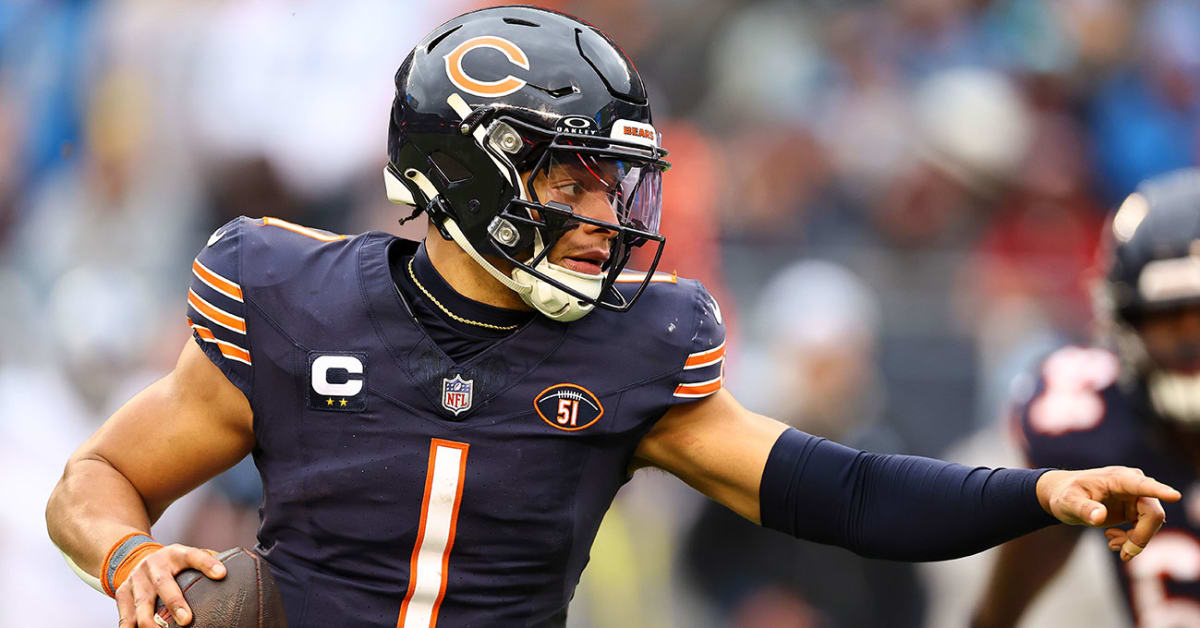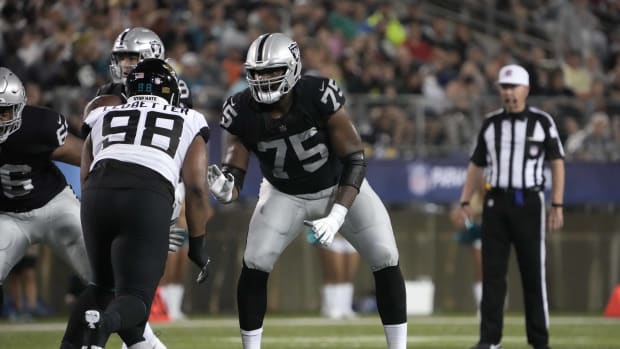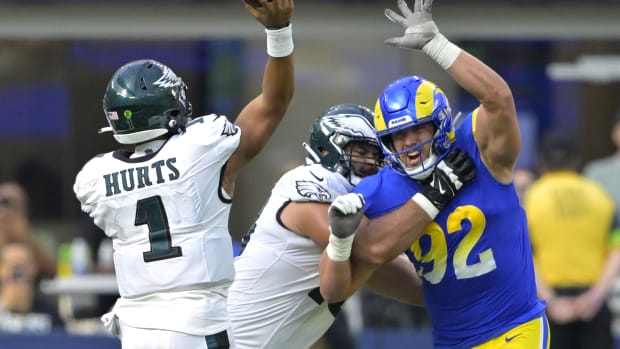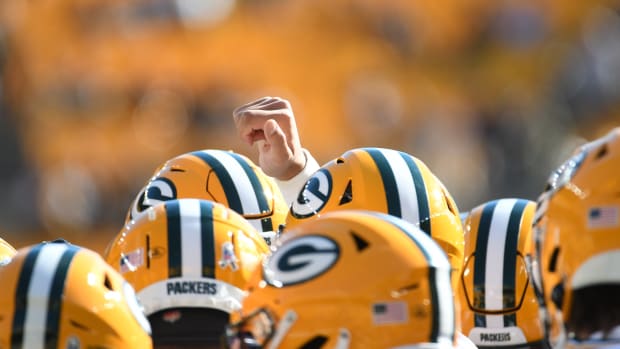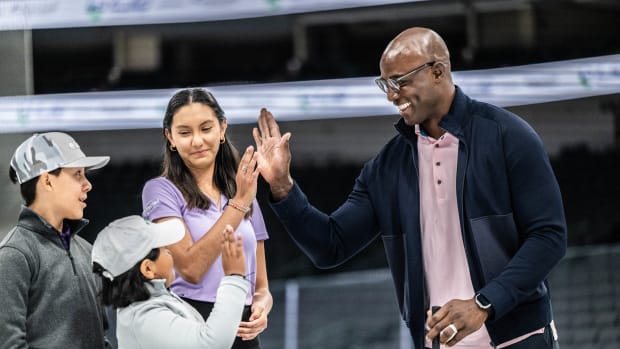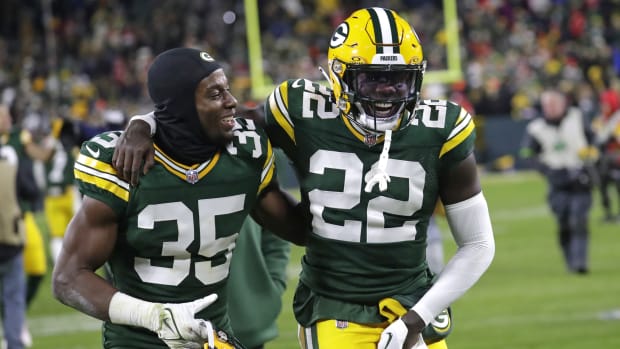The Bears Should Draft a QB No. 1 ... but Still Keep Justin Fields
Asset management in the NFL is incredibly difficult. You are either so good at it that you become known for a certain callousness (which, in turn, leads to its own set of problems), or you are so bad at it that you become the Carolina Panthers.
Carolina, over the course of a few seasons, dealt Christian McCaffrey, one of the most dynamic players in the NFL (and a fringe MVP candidate who should be getting more serious consideration) for a bundle of picks that were repackaged to draft Bryce Young and linebacker DJ Johnson. They included DJ Moore, an incredible value at the receiver position and a still-appreciating talent set, as part of the Young trade. They failed to trade Brian Burns at the 2022 trade deadline and will likely franchise-tag him in the event Burns fails to agree to a long-term deal. This will only complicate negotiations because, as edge players such as Micah Parsons hit the open market, the financial burden on teams hoping to sign pass rushers is going to increase. Carolina offers one example of how many incorrect decisions can put an organization miles behind the curve.

The Bears have a tough decision to make this offseason, and they should consider every possible option.
Mike Dinovo/USA TODAY Sports
One of the teams that fleeced the Panthers, the Chicago Bears, are on another end of the spectrum, or are at least establishing themselves in that way. And they have, by far, the most interesting question of asset management coming this offseason.
With a Panthers loss this past weekend, the Bears wrapped up the No. 1 pick via the Young trade from a year ago. Through the past few months, we have viewed the potential scenarios as a kind of binary set of outcomes. Either:
• The Bears trade the No. 1 pick for a massive haul and invest long-term in Justin Fields, who is an ascending player.
• The Bears trade Fields, who, because he is an ascending player, could net the team a third first-round draft pick in 2023 (in addition to the Bears’ own pick and Carolina’s) to help them build for the rookie quarterback.
But what if I were to venture a third option? And before you say no—before you accuse me of being all Panthers-like—let’s at least flesh the argument out. What if the Bears embrace an honest and open process, keep Justin Fields and sit whomever they like best at No. 1 for at least the final year of Fields’s rookie contract, trading him on his fifth-year option salary for less than he might fetch in a trade this coming offseason?
Your standard, block-and-tackle GM analysis is going to be: Draft No. 1 overall, give yourself a longer runway on a rookie contract, get rid of Fields, take the compensation while he’s hot.
Watch the Bears with Fubo. Start your free trial today.
The standard response by a player in the Bears’ locker room resulting from that outcome is going to be: Why the hell did they trade for a bunch of veterans if they’re going to stick a kid back there next year? Get us more help.
The latter is what makes this matter delicate. The Bears have rapidly improved the roster, and while that has come via sound drafting, it has also come through a targeted binge in free agency and at the trade deadline. The Bears could win eight games this year, and it would stand to reason that they could win more next year, especially if they get the easier slice of the NFC North’s nonconference schedule. Chicago’s best players are relatively young, but I think we can all agree that there is a window now, as well as a potential window in the near future that coincides with the further development of their past two draft classes. The “future” of the Bears is just less certain. We can be far more certain that Moore and Montez Sweat will be good in 2024.
By keeping Fields and drafting Drake Maye or Caleb Williams, the Bears would be eschewing a potentially historic haul of draft picks. The Bears got two first- and two second-round picks for the No. 1 pick in 2023, plus Moore. Minus another strong veteran included in a trade this year, we could see more early- to mid-round picks included in a ’24 deal.
They would also be giving up any capital they’d receive for Fields, which, depending on the desperation of a QB-needy team, could be anywhere from a Falcons first-round pick, or combination of picks to equal first-round value, to something at least better than the compensatory value they’d receive upon his someday leaving in free agency.
Subscribing to any of the three scenarios is like committing partially to a fantasy. In the scenario where the Bears trade Fields, there has to be a hope that Fields has reached his peak, has already been maximized and will not shadow over the progress of a rookie quarterback from afar by comparison. While Fields may indeed be as good as he’s going to be, a simple reimagination of Lamar Jackson’s career, for example, reenergized Baltimore’s offense and sparked an MVP campaign. At the same time, the Bears have to draft a rookie quarterback on par or better than C.J. Stroud (meaning, someone capable of leading them into playoff contention in Year 1, which, again, we can reasonably argue Fields is capable of in 2024).
In the scenario where the Bears trade the No. 1 pick and invest in Fields, there is also a fantasy at play. As good as the Bears have been at drafting under Ryan Poles, I can promise you that no general manager is infallible. It’s mostly a crapshoot for everyone, with half of all first-round picks signing second contracts elsewhere and only 31% of first-round picks signing second contracts with their original club. If Chicago nets three total first-round picks for the No. 1 pick, we can almost guarantee that one of those players is not going to be that good (more likely, two of them won’t be that good). Data suggests that one of those players will be on the roster five years from now. I’m not saying this is a reason to ignore draft capital, as it’s still the most effective way to build an affordable roster core, but I am saying that we cannot let our obsession with young talent cloud what could be a good opportunity elsewhere.
And in my scenario, we also have to be dreamers. As I’ve outlined it, that means letting Fields know that the Bears are drafting a quarterback but holding on to Fields for at least the next season. While the best case could play out—Fields accepts his disposition, understands that playing incredibly well this year is his best avenue to a top-of-market contract extension, regardless of where, while the rookie gets invaluable experience and the chance to learn the rhythms of a locker room and the NFL game how Patrick Mahomes and Jordan Love did, and the veterans already on the team feel as though they’re being put in the absolute best position to cash postseason checks—we’re talking about a major market football team and all of the complications that come with it. If the messaging is off, if Fields struggles, there is also the opportunity for the Bears to foist a rookie onto the field during his first season, anyway. Doing so would torpedo Fields’s trade value (like when Carson Wentz was benched for rookie Jalen Hurts, though Wentz still fetched a first-round pick in a trade to Indianapolis) and could create factions in the locker room. Is Fields of the Aaron Rodgers temperament, where a rookie would resemble a persistent, nagging threat that manifests itself in passive aggression? Or, is Fields business minded? Could he digest the scenario, understanding that, if he continues to progress, he’d likely have multiple suitors and a long-term extension in free agency of 2025? (With Dak Prescott and Trevor Lawrence both slated to re-up, it’s not a bad year to get paid.)
I think the Packers and Chiefs are thankful for enduring the awkwardness. Jordan Love is a game away from lifting the Packers to the playoffs in his first season as a starter. And while his run has not been perfect, he threw for 30 touchdowns and 11 picks this season, in addition to four rushing touchdowns. If Love throws or runs for one more touchdown in the season finale, he’ll tie the number of points scored by Cam Newton during Newton’s then historic 2011 rookie season. One more passing touchdown for Love would tie Justin Herbert’s rookie record for most touchdown passes in a rookie season. Patrick Mahomes is … Patrick Mahomes. We have been reminded, year after year, that so many rookie quarterbacks are prone to being lost in the shuffle, only to reemerge, like Geno Smith, Baker Mayfield or Ryan Tannehill, as capable players in another system. Why not buy yourself some of that time?
Is chasing this potential progression, which would provide far more security at the most critical position in professional sports and just as long of a window with an affordable QB rookie contract, a more enticing option than simply riding with a young quarterback or stockpiling more draft capital?
Let’s put it this way: If the Bears are committed to taking a QB1 in this year’s draft, then also keeping Fields seems like a simpler decision than people are treating it as. The chance of creating a long-term, stable bridge of quarterback play and multiple playoff appearances starting right away is far more valuable than what Fields would net in a trade this year. We could be talking about netting a second-round pick, versus multiple trips to the playoffs.
If the Bears are committed to Fields wholly and unquestionably, and dislike all of the passers in this year’s draft, then the question is moot.
But, if the Bears are starting to feel the pressure of the decision that everyone will judge them on forever, if they are wondering whether they will go down as the Dallas Cowboys post–Herschel Walker or the 2023 Carolina Panthers, they should not discount the possibility of having some cake and eating it, too.
































